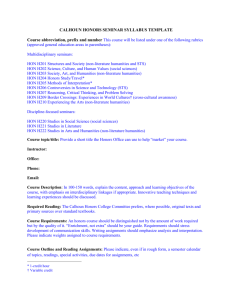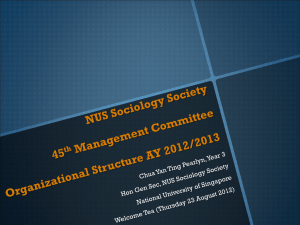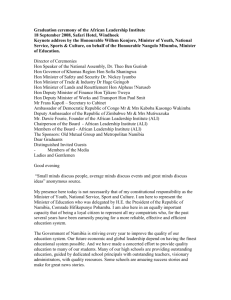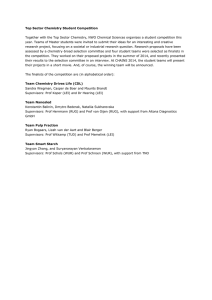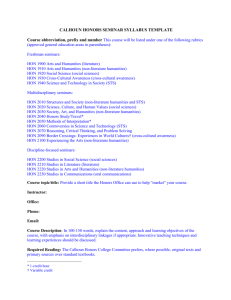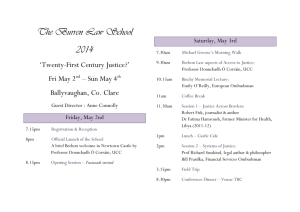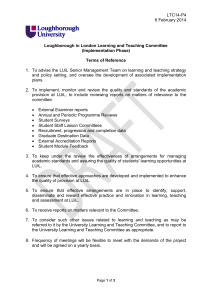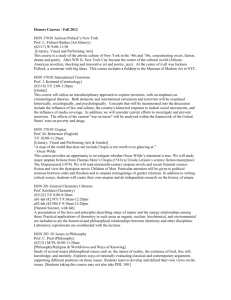ECO 102:H1 Honors Principles of Macroeconomics Prof. M. Naples
advertisement
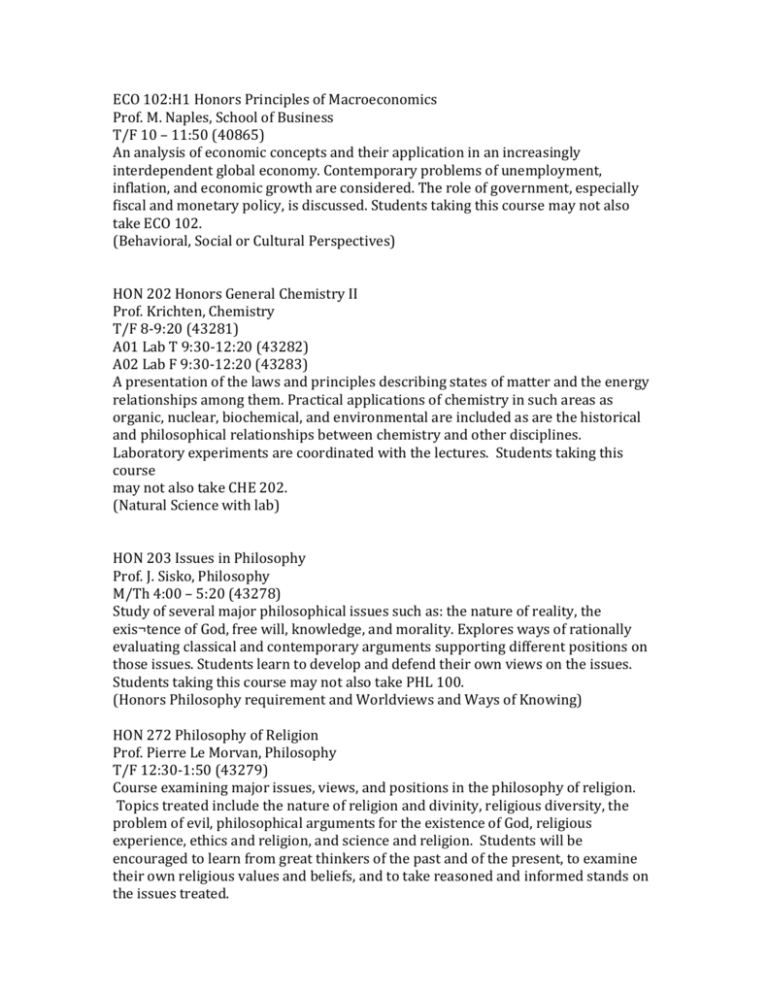
ECO 102:H1 Honors Principles of Macroeconomics Prof. M. Naples, School of Business T/F 10 – 11:50 (40865) An analysis of economic concepts and their application in an increasingly interdependent global economy. Contemporary problems of unemployment, inflation, and economic growth are considered. The role of government, especially fiscal and monetary policy, is discussed. Students taking this course may not also take ECO 102. (Behavioral, Social or Cultural Perspectives) HON 202 Honors General Chemistry II Prof. Krichten, Chemistry T/F 8-9:20 (43281) A01 Lab T 9:30-12:20 (43282) A02 Lab F 9:30-12:20 (43283) A presentation of the laws and principles describing states of matter and the energy relationships among them. Practical applications of chemistry in such areas as organic, nuclear, biochemical, and environmental are included as are the historical and philosophical relationships between chemistry and other disciplines. Laboratory experiments are coordinated with the lectures. Students taking this course may not also take CHE 202. (Natural Science with lab) HON 203 Issues in Philosophy Prof. J. Sisko, Philosophy M/Th 4:00 – 5:20 (43278) Study of several major philosophical issues such as: the nature of reality, the exis¬tence of God, free will, knowledge, and morality. Explores ways of rationally evaluating classical and contemporary arguments supporting different positions on those issues. Students learn to develop and defend their own views on the issues. Students taking this course may not also take PHL 100. (Honors Philosophy requirement and Worldviews and Ways of Knowing) HON 272 Philosophy of Religion Prof. Pierre Le Morvan, Philosophy T/F 12:30-1:50 (43279) Course examining major issues, views, and positions in the philosophy of religion. Topics treated include the nature of religion and divinity, religious diversity, the problem of evil, philosophical arguments for the existence of God, religious experience, ethics and religion, and science and religion. Students will be encouraged to learn from great thinkers of the past and of the present, to examine their own religious values and beliefs, and to take reasoned and informed stands on the issues treated. (Honors Philosophy requirement and Worldviews and Ways of Knowing) HON 344 The Holocaust in Art and Literature Pro. E. Freidman, English and WGS Prof. L. Fichner-Rathus, Art History W 9:00 – 11:50am (43464) The course is a study of the Nazi Holocaust against the Jews through the examination of art and literature by victims, survivors, and others including contemporary artists and writers who have used the Holocaust as a theme in their work interdisciplinary. (Literary, Visual, and Performing Arts) HON 365 The Natural History of the Galapogos Islands and Ecuador Prof. D. Lovett, Biology M/R 2:00 – 3:20 (43517) An introduction to the natural history (including ecology of plants and animals, geology, and climate) of the Galapagos Islands and Ecuador, with a reflection on interactions between these and the history, culture and economics of the Islands and Ecuador from pre-colonial to modern times. Offered during spring semester. (Students must also enroll in BIO 366/HON 366/IDS 366, which will be offered during Maymester of the same year.) (Natural Science and Global) HON 370:01 Militarism and Gender in American National Security Policy Prof. John Landreau, Women’s and Gender Studies M/Th 12:30-1:50pm (43479) This course examines U.S. national security policy and rhetoric from the Cold War through the contemporary period. Specifically, our focus this semester is on two foreign military involvements: the war in Vietnam and the more recent interventions in Iraq and Afghanistan. Course texts and class discussion highlight the role of American exceptionalism in promoting, justifying and defending the use of military power in both foreign policy contexts. Some of the questions we will be asking over the course of the semester are: what is security, and what strategies do we use to promote it? What are the assumptions about national history and identity that form our political vocabulary in the context of foreign threats? What role does gender play in our assumptions about the presidency, about citizenship, and about militarism and security? (Global and Gender) HON 370:02 After the Wall: Films about the end of the Soviet Union Prof. Terrence Byrne, Communications T 5:30-8:20 (43524) In this course we will study films from former Soviet satellite states documenting the departure of the Russians and portraying the state of things in the aftermath of the fall of the Soviet Union. These will include films from Germany, the Czech Republic, Hungary, Poland and Russia itself. (Global) HON 370:03 International Terrorism Prof. J. Krimmel, Criminology T/F 12:30-1:50pm (43390) This course will utilize an interdisciplinary approach to explore terrorism, with an emphasis on criminological theories. Both domestic and international extremism and terrorism will be examined historically, sociologically, and psychologically. Concepts that will be incorporated into the discussion include the influence of law and culture, the country's historical response to radical social movements, and the influence of media coverage. In addition, we will consider current efforts to investigate and prevent terrorism. The effects of the current "war on terror" will be analyzed within the frame work of the United States' wars on poverty and drugs. (Global) HON 370:04 Gender and Language Prof. H. Didi-Ogren, Modern Languages M/R 10:00 – 11:20am (43525) Since its inception in the 1970's, the field of gender and language has grown to encompass a broad range of disciplines (sociolinguistics, anthropology, psychology, communication studies, literature, etc.) and theoretical interests. This course will provide an historical overview of language and gender research and the development of various theoretical and methodological approaches. This overview begins in the West (primarily the United States and the United Kingdom), but quickly expands to include a variety of countries, languages, and cultures. From this overview we will see that there is ongoing discussion about both the most effective approach to the study of gender and language, and about the theoretical underpinnings which are evoked by, for example, various definitions of key concepts such as "gender." Particular attention will be given in the course to approaches to language and gender that have developed within sociolinguistics and linguistic anthropology and which focus on the way in which both language and gender are embedded in structures of power, authority, and social inequality, and with conflicts over these social structures. (Race/Ethnicity, Global, and Literary, Visual, and Performing Arts) HON 370:05 African Cinema: Francophone African Experience Through Film Prof. M. Sow, African-American Studies M 5:30 – 8:20pm (43527) An in-depth exploration of Francophone African cinema by Africans in front of and behind the camera. Cinema, as an ideological tool, has played a major role in Africa during colonial times and after the independence of African nations. It extends the spectrum of choices for students as well as laying the foundations of African history and culture from a filmic perspective. (Race/Ethnicity, Global, and Literary, Visual, and Performing Arts)

